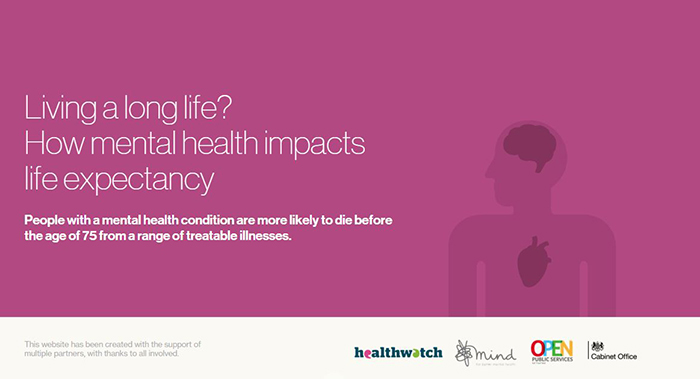The challenges of creating a society where all can flourish require bold examinations of human wellbeing. If subjective wellbeing was made a critical component of productivity, what types of social infrastructure would emerge as a driver of prosperity? What role does technology play in our health systems? How can social movements be utilised to improve public health? How might this influence the design of our built environment and physical infrastructure? How might we integrate emotional literacy into the education system, as psychotherapist Susie Orbach proposes, to help people maintain better relationships at work and home?
With these questions in mind, The RSA is reimagining approaches to health and wellbeing, and has just embarked on it's most ambitious project yet. As one of three national learning partners for NHS England’s Health as a Social Movement programme, the RSA – with NEF and Nesta – is driving support for health beyond the healthcare system. It is hoped that through this programme we will start to see a step change in prevention, a shift in power to people and their social networks, and deeper engagement with communities to better help them serve their own health needs.
Download our guide to creating a wellbeing society

The way we deliver healthcare has become highly adept at remedying acute illnesses and injuries but has been less successful at preventing disease, ensuring high quality of life for people with chronic conditions, or sustaining the World Health Organisation's definition of health as “a complete state of physical, mental and social wellbeing”.
This more holistic approach can better make the distinction between illness and sickness in order to properly address long-term health needs as it is more useful to view health as an interconnected 'helix' rather that an up or down scale of ‘well’ or ‘unwell’. In sum, instead of focusing just on acute illnesses, services should focus on ensuring that those patients are supported before they require clinical interventions.
The NHS Five Year Forward View takes this on as a central component of it's plan for England's health system, which says in order to better realise the ‘renewable energy of communities’ we must harness the power of social movements in order to rapidly improve health.
In order to do this, we need to design services that are built ‘with, not for’ people.
I recently visited Norwich and Waveney’s Wellbeing Service that is at the forefront of this change. Alongside NHS IAPT (talking therapies) the Service is delivering an ambitious social programme supported by peer-to-peer support workers and self-guided treatment, with 'wellbeing advisors' facilitating workshops allowing service users to choose to manage their own treatment. One leader of the service told me: "We don't like the word prescribing". Their interventions, some as simple as taking someone with social anxiety to a café, to walking groups and workshops on resilience and relationship commitment are reimaigning health and social care and breaking down the traditional clinician-patient relationship.
Norfolk Clinical Commisioning Group made the strategic decision to invest £10 million from secondary care in order to fund this new service, which was mandated to embed preventative health initiatives. We need more of these approaches if we are able to meet the huge challenges to the health service and our collective wellbeing.
Previous RSA work in this area
The RSA is evaluating what an economy centred around human welfare looks like. From our research on recovery, to opening up health data, to understanding and unleashing community capital, we are reimagining wellbeing. The aim of our Cabinet Office funded mental health data project was to enable the public to compare local services, make more informed choices and help service-users and their families, regulators and local organisations to hold providers to account. We argued that the physical health of mental health patients was being neglected by GPs and others in primary care services, and found that mental health patients were up to 25% less likely to be offered basic tests, such as cholesterol, blood pressure and cervical cancer screening.
Our Connected Communities report sought to understand how community and social interactions affect people’s wellbeing. The report makes the case that connected, supportive communities are not only critical to building the kind of society that we'd all like to live in, but can also be mobilised to bring about better individual health outcomes. We know that these connected communities are ‘contagious’ and foster trust and inflate a sense of purpose and wellbeing.
As demonstrated in Norwich, we’ve found that peer-to-peer support is crucial as a preventative tool for good mental health. We need to highlight the ways support networks don’t just act as coping mechanism for stressful lives. The RSA’s Whole Person Recovery project advocates for personalised recovery goals supported by a community-based approach. It recognises that recovery involving lasting changes to an individual doesn’t have a discreet ‘end point’ and is a journey.
We’re demonstrating that the future of healthcare has to move beyond the remedial approach to addressing health and that it no longer appears to be sufficient to sustain wellbeing and also fails to meet the challenge of today’s social problems; from increasing inequality and entrenched social isolation to rises in long-term illness, mental health disorders and an aging population.
We're reimagining wellbeing - Join us to help develop our vison of a healthy society and help deliver our mission to give people the Power To Create by following #RSAWellbeing @theRSAorg, downloading our Wellbeing Guide or by keeping up to date by visting our project page for all our work on health and wellbeing.
Tom Harrison is the RSA's Emma Lindley Intern for mental health and wellbeing.
Related articles
-
Did Bevan's bedpan test set the NHS on the wrong track?
Ed Cox
Ed Cox, Director of Public Services and Communities, argues that the NHS needs a more devolved approach in the decade ahead.



Join the discussion
Comments
Please login to post a comment or reply
Don't have an account? Click here to register.
Tom my apologies for coming in so late having only picked up this topic here. In response to Wiard's comments around the Scotland dimension, I thought you might find relevant the NHS Scotland document,
'Good Mental Health for All'
As stated in the introduction; 'NHS Health Scotland has been working with representatives of the National Mental Health Improvement Network on creating a vision for public mental health in Scotland.... The work focuses on the promotion of mental health and wellbeing, the prevention of mental health problems, and tackling inequalities in mental health. This is sometimes referred to as a Public Mental Health approach.'
Further text and the document is available here:
http://www.wellscotland.info/mhi/good-mental-health-for-all
It's really stimulating to read more on the endeavour to promote and seek action on wellbeing - both mental and physical. The focus on health assets is one that is one that is a backdrop to my work; in our report with The Health Foundation (2015 see: http://www.health.org.uk/search?search=assets%20based%20approaches) we revisited our argument that the health and social care system, indeed the wider public sectors really need to shift the paradigm of practice, investment and collaboration to a "what creates health" perspective (a focus on Salutogenesis) and less on groups of people with 'conditions'. We argue this as it opens up a wider and richer vein of action in local places where wellness is seen outside of the context 'illness' and opens up potential for all people in a place (neighbourhood for example) to engage in forms of social, community based movements for their wellbeing. In so doing attending to the wider, and more subtle nuances of "what makes us healthy" - however we also argue that such a focus and related approaches need to address and tackle the wider inequalities that influence health and wellbeing.
If such a shift is not made then I think we'll just be tinkering on the edges.
Please get in touch if you'd like to discuss and hear more.
Thanks
Simon
Great article and good to know about these initiatives. What part can and should children play in all this? For most of my career I have bene working with governments, UN organisations and other international and local organisations to figure out how to draw children into understanding and then advocating for good health. In many (if not most) low resource settings, children between the ages of 10 and 14 become carers of young children and can have an influence on the health and well being of their siblings, friends and even family members. The types of appraoches that we use not only informs children but recognises and praises their role, develops their lifeskills and stregthens bonds between generations. Perhaps one of the greatest things we see happening is children developing agency. For more have a look at www.childrenforhealth.org. I have often thought the work we do is as relevant to health and wellness in this country as it is in many of the counties in the south where I have worked. Best wishes. Clare
Great article!
Here in Bracknell Forest we have just launched a new social movement programme focused on health and well-being. The 'Year of Self Care' is focusing on a different topic each month (Feb is mental health). It aims to help local individuals, groups and organisations to develop new health and well-being initiatives, or promote existing ones. We've already has a great response and its growing fast.
The emphasis is on inclusion and we focus on getting new people involved in health initiatives, not just the usual crowd. So for example, we have teamed up with a local coach to establish a fitness programme for those who may not have been physically active for some time (or ever).
At the heart of our programme is the 'Health Makers' scheme which trains volunteers to offer self-management support to others with a long term condition.
Here's a link to our 90 second intro film thingy! https://www.youtube.com/watch?v=RKOMW5Tu78o
Please get in touch if you'd like to know more.
Lisa
Hi Lisa,
Thanks for the link! I've had a look - very interesting. I particularly liked the video referring to anxiety and depression. I'm minded to link you to our mental health data project (aimed at service users accessing information about how they are supported by GPs):
www.thersa.org.uk/mentalhealth - let me know if you'd like to link to it on your site.
Always happy to hear more about new health initiatives. You can contact me at: tom.harrison@rsa.org.uk.
Thanks, Tom
Hi Wiard,
Thank you for your helpful comments. I think there is often evidence of English-centrism in policy and with our upcoming work with NHS England forming a large part of our focus on health over the next year the reforms in England are taking more of out attention. Whilst it should be said the changes to the health system in England however are not insignificant and their effects will be felt across the UK in the original wording of the document, I didn't make this clear enough. The article has since been duly amended.
As we has discussed offline, I think your interventions provide us with useful steer to pursue the implications for the health system under this Parliament (particularly with Assembly elections in Wales and the Scottish Parliament elections fast approaching).
I really look forward to pursuing this with you and other Fellows.
Best,
Tom